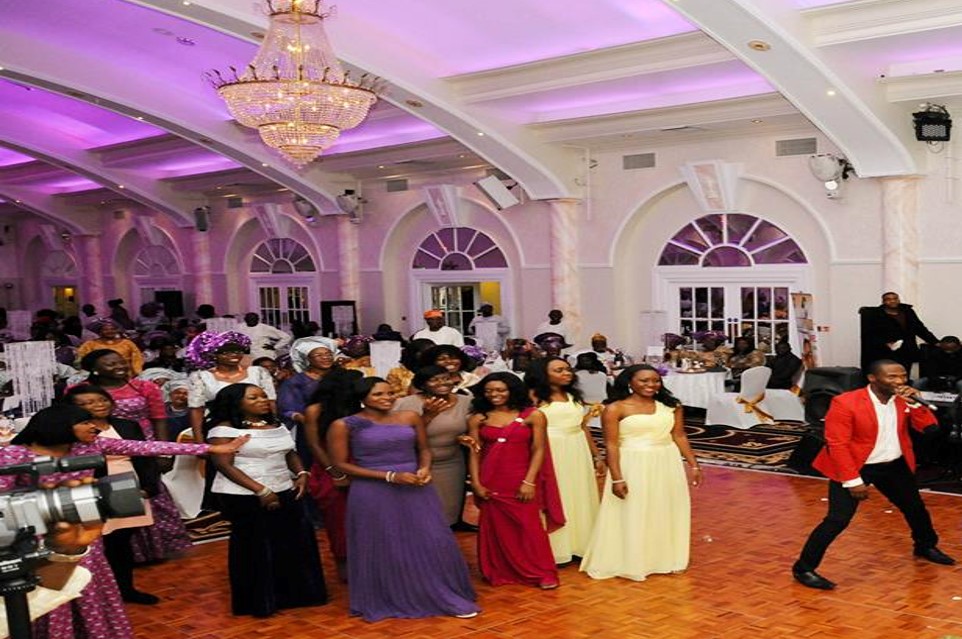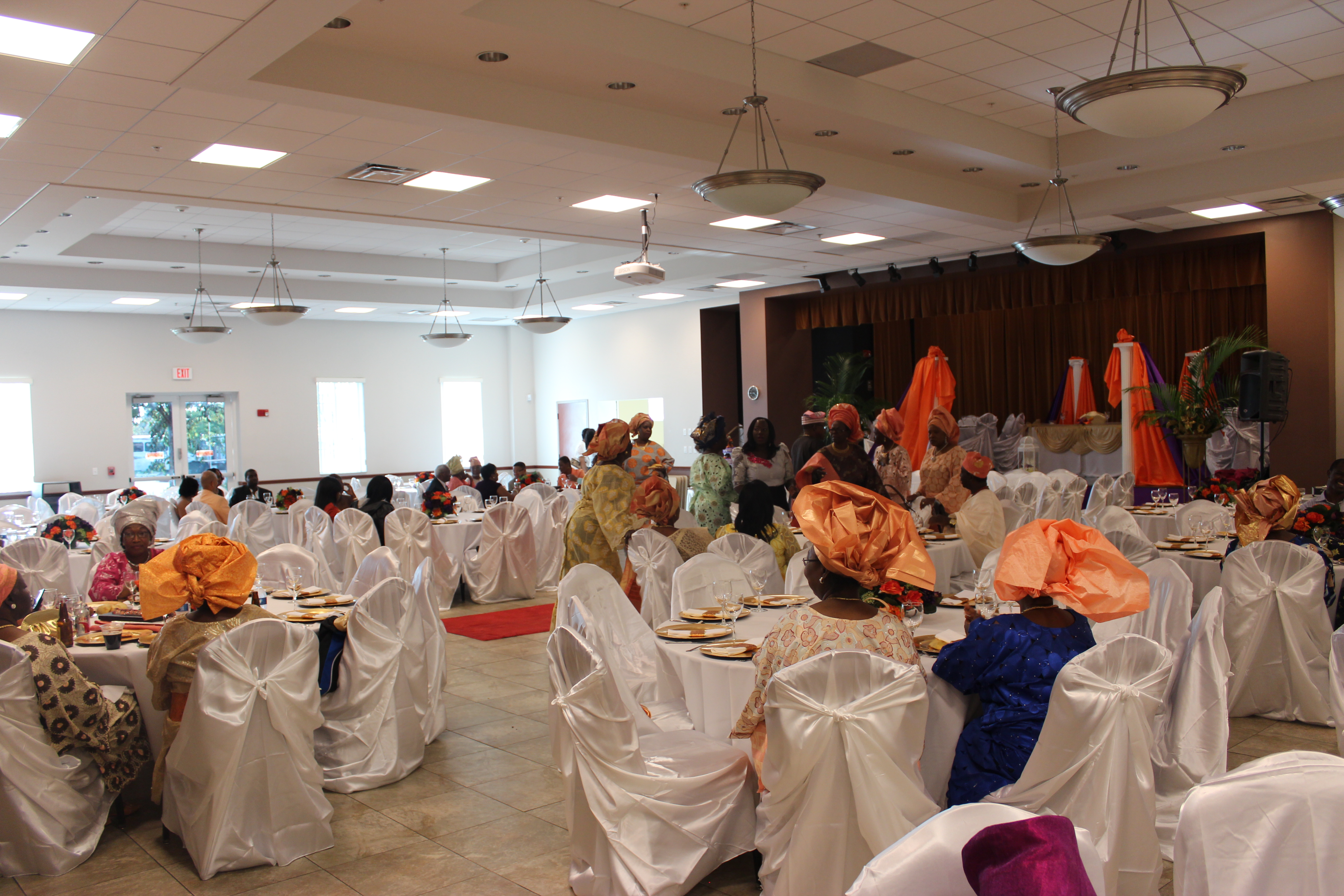Yorùbá fẹ́ràn ayẹyẹ ṣi ṣe púpọ̀ pàtàki fún igbéyàwó. Ni ayé àtijọ́, ìnáwó igbéyàwó kò tó bi ó ti dà ni ayé òde òni. Titi di bi ogoji ọdún sẹhin, ilé Bàbá Iyàwó tàbi ọgbà ẹbi ni wọn ti nṣe àpèjọ igbéyàwó. Ẹbi ọ̀tún àti ti òsi yio joko fún ètò igbéyàwó lati gba ẹbi ọkọ ni àlejò fún àdúrà gbi gbà fún àwọn ọmọ ti ó nṣe igbéyàwó àti lati gbà wọn ni ìyànjú bi ó ṣe yẹ ki wọn gbé pọ̀ ni irọ̀rùn. Ẹbi ọkọ yio kó ẹrù ti ẹbi iyàwó ma ngbà fún wọn, lẹhin eyi, ẹbi iyàwó yio pèsè oúnjẹ fún onilé àti àlejò. Onilù àdúgbò lè lùlù ki wọn jó, ṣùgbọ́n kò kan dandan ki wọn lu ilu tàbi ki wọn jó.
Nigbati ìnáwó rẹpẹtẹ fún igbeyawo bẹ̀rẹ̀, àwọn ẹlòmíràn bẹ̀rẹ̀ si jẹ igbèsè lati ṣe igbéyàwó pàtàki igbéyàwó ti Olóyìnbó ti a mọ si igbéyàwó-olórùka. Nitori àṣejù yi, olè bẹ̀rẹ̀ si jà ni ibi igbéyàwó, eyi jẹ́ ki wọn gbé àpèjẹ igbéyàwó àti àwọn ayẹyẹ yoku kúrò ni ilé. Wọn bẹ̀rẹ̀ si gbé àpèjẹ lọ si ọgbà ilé-iwé, ilé ìjọ́sìn tàbi ọgbà ilú àti ilé-ayẹyẹ.
- Igbéyàwó òkèrè ni Ilú Òyìnbó – Nigerian Wedding in London. Courtesy: @theyorubablog
- Igbéyàwó òkèrè ni Òkè-Òkun – Nigerian Wedding in Florida U.S.A. Courtesy: @theyorubablog
Yorùbá fẹ́ràn ayẹyẹ ṣi ṣe púpọ̀, ṣùgbọ́n àṣà tó gbòde ni ayé òde òni, ni igbéyàwó àti ayẹyẹ bi ọjọ́ ìbí ṣi ṣe ni òkèrè. Gẹgẹ bi àṣà Yorùbá, ibi ti ẹbi iyàwó bá ngbé ni ẹbi ọkọ yio lọ lati ṣe igbéyàwó. Ẹni ti kò ni ẹbi àti ará tàbi gbé ilú miran pàtàki Òkè-Òkun/Ilú Òyìnbó, yio lọ ṣe igbéyàwó ọmọ ni òkèrè. Wọn yio pe ẹbi àti ọ̀rẹ́ ti ó bá ni owó lati bá wọn lọ si irú igbéyàwó bẹ́ ẹ̀. Ẹbi ti kò bá ni owó, kò ni lè lọ nitori kò ni ri iwé irinna gbà. A ri irú igbéyàwó yi, ti ẹbi ọkọ tàbi ti iyàwó kò lè lọ. Eleyi wọ́pọ laarin àwọn Òṣèlú, Ọ̀gá Òṣìṣẹ́ Ìjọba àti àwọn ti ó ri owó ilú kó jẹ.
Igbéyàwó àti ayẹyẹ ṣi ṣe ni òkèrè, jẹ́ ikan ninú àṣà ti ó mba owó ilú jẹ́. Lati kúrò ni ilú ẹni lọ ṣe iyàwó tàbi ayẹyẹ ni ilú miran, wọn ni lati ṣẹ́ Naira si owó ilu ibi ti wọn ti fẹ́ lọ ṣe ayẹyẹ, lẹhin ìnáwó iwé irinna àti ọkọ̀ òfúrufú. Ilú miran ni ó njẹ èrè ìnáwó bẹ́ ẹ̀, nitori bi wọn bá ṣe e ni ilé, èrò púpọ̀ ni yio jẹ èrè, pàtàki Alásè àti Onilù. A lérò wi pé ni àsìkò ọ̀wọ́n owó pàtàki owó òkèrè ni ilú lati ṣe nkan gidi, ifẹ́ iná àpà fún ayẹyẹ á din kù.
ENGLISH TRANSLATION
Yoruba people love celebrating, particularly during weddings. In the olden days, marriage ceremony was not as expensive as it is nowadays. Up till about forty years ago, marriage ceremony was often held in the home of the Bride’s father or in the family compound. During traditional marriage, both the paternal and maternal side of the Bride would gather to host the Groom and his family in order to pray for the Bride and Groom and to advise the couple on how to live peaceably after the ceremony. The Groom’s family would bring in the Bridal Items as contained in the Bride’s family list, thereafter, the Bride’s family would entertain everyone present with food and drinks. Local musicians could provide entertainment for people to dance, but it is not compulsory to engage musicians or dance.
When expensive wedding celebration became the norm, some began to go into debt to bear the cost, particularly, the English Wedding known as “Wife with a ring”, Monogamous/ Registry/Church Weddings. As a result of these excesses, thieves began to attack at weddings, hence the shifting of marriage and other ceremonies away from family homes. Celebrants began to rent neutral places such as School Field, Church Hall, Towns Hall and Event Places.
Yoruba love celebrating but the prevalent culture nowadays, is “Destination Wedding” and hosting events such as birthday abroad. According to Yoruba Culture, Groom’s family would go to the Bride’s family to seek the Bride’s hand in marriage. Those with no family ties and are not living Abroad/Europe are now craving to host marriage ceremony away from home. They often invite those who can afford it among their family and friends along. In some of these Destination Weddings, poor family members and friends are left out because they are often denied Visa. In some instances, close Groom/Bride’s family members cannot afford to attend. This type of Wedding is common among the Politicians, Senior Public Servants and those who have looted public fund.
Destination Wedding or other celebrations is one of the culture of squandering the national wealth. In taking wedding ceremony to other Countries, the local currency (Naira) has to be exchanged to foreign Currency where the wedding or event would be held in addition to travel expenses – Visa Fees and Air fare. It is the foreign Countries that benefit from such expenses, because many local people such as Caterers and Musicians would have benefitted more if it has been held within the Country. It is hoped that at this period of fund scarcity for laudable project especially scarcity of foreign exchange, the love of squandering fund on parties will reduce.
Originally posted 2016-04-26 18:55:23. Republished by Blog Post Promoter




